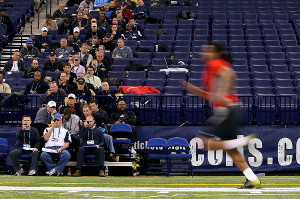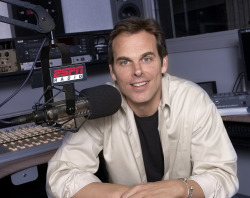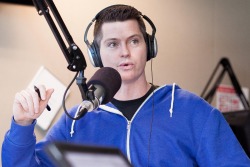This week I had the privilege of spending a few days in Bristol, CT at ESPN among some of the brightest minds in the sports radio industry. As usual there was a ton of conversation on ways to improve our business but one specific question jumped out to me and it’s something I have a strong passion for – discovering new talent. Everyone has their own ideas on how to find new blood and introduce tomorrow’s sports radio stars to local audiences but for me this is something that I believe is critical for every person who programs a radio station.
 More times than not when you look around the industry, stations are quick to take the safest approach possible and hire familiar names and voices to the market rather than introduce someone who requires more explanation. It makes sense most times because familiar names draw quicker reaction from local audiences and when you add advertising dollars into the conversation, it’s easier to sell something familiar than something foreign. What gets lost in that equation though is that sometimes the short-term gain is not as strong as a long-term one and usually it takes a mixture of market proven performers and new exciting personalities to give a radio station a fresh feel.
More times than not when you look around the industry, stations are quick to take the safest approach possible and hire familiar names and voices to the market rather than introduce someone who requires more explanation. It makes sense most times because familiar names draw quicker reaction from local audiences and when you add advertising dollars into the conversation, it’s easier to sell something familiar than something foreign. What gets lost in that equation though is that sometimes the short-term gain is not as strong as a long-term one and usually it takes a mixture of market proven performers and new exciting personalities to give a radio station a fresh feel.
As a programmer, it’s not easy to tell your bosses, staff and listeners to wait for future success and look at the big picture. We live in a “win now” society where people focus more on the next day than they do on the next year. I remember growing up watching baseball and you’d hear about players spending 5-6 years in the minor leagues before being brought up to the major leagues. Today, once a player shows an ounce of potential, he’s rushed up to the grand stage.
In radio, it’s not much different. We seek broadcasters who can get on the air and make an immediate impact, even if that isn’t always realistic. In a world where ratings are critical to deciding how advertisers invest in your brand, it’s imperative that when you introduce new talent to the marketplace that it works. Sometimes you’ll get some time to let someone develop but usually the leash you’re provided is very short.
I’ve been fortunate twice during my career to build new stations and have a chance to develop people slowly and in each situation, we had success. Once that success is obtained though, it becomes much harder to do that because people become accustomed to success and fearful of losing it as a result of change, especially if it involves unfamiliar personalities.
 When I think about the role of a Program Director as it applies to scouting and discovering talent, I compare it to the role of a professional scout in the NFL or MLB. There are tons of roads to navigate and some will work and some won’t but you’ve got to always be looking and planning for the “what if” scenario. Part of that includes consistent evaluating of people inside the industry as well as keeping an eye on those who display potential while climbing up the ladder.
When I think about the role of a Program Director as it applies to scouting and discovering talent, I compare it to the role of a professional scout in the NFL or MLB. There are tons of roads to navigate and some will work and some won’t but you’ve got to always be looking and planning for the “what if” scenario. Part of that includes consistent evaluating of people inside the industry as well as keeping an eye on those who display potential while climbing up the ladder.
Last week the NY Times published a piece on Derek Jeter which covered how the Yankees Shortstop was discovered in 1991. I found myself thinking of the numerous scenarios that have unfolded in my own career that have led me to finding talented people and putting them on the road to have great success. Clearly they had to have the ability to get the job done but someone also had to recognize their talent, take a chance on hiring them and provide them with the tools, coaching and positive reinforcement necessary to help them.
In this piece, the scout (Dick Groch) talks about how he wasn’t even supposed to attend the camp where he discovered Jeter but yet when he watched him perform, he knew instantly that he had the tools that would translate to the highest level. In my business we call this “having an ear” or an “eye for talent“. There’s no way he could have known for sure that Derek Jeter would play 20 years in the big leagues, win 5 world titles and become a future hall of famer but his instincts told him this was a kid worth going to bat for. By doing so, the Yankees front office performed further evaluations and ultimately agreed with the reports and selected Derek when the chance to draft him was presented.
 When you think of sports radio, we don’t get an annual draft but there are plenty of Derek Jeter’s out there. One example comes immediately to mind. Scott Masteller was sharp enough to recognize Colin Cowherd’s talents in Portland and provide him with an opportunity to do local radio. Bruce Gilbert was smart enough to recognize what Scott saw and bring Colin to ESPN Radio. Obviously Colin had to be uniquely talented in order to earn those opportunities but even a great talented individual needs someone who’s willing to take a chance on him.
When you think of sports radio, we don’t get an annual draft but there are plenty of Derek Jeter’s out there. One example comes immediately to mind. Scott Masteller was sharp enough to recognize Colin Cowherd’s talents in Portland and provide him with an opportunity to do local radio. Bruce Gilbert was smart enough to recognize what Scott saw and bring Colin to ESPN Radio. Obviously Colin had to be uniquely talented in order to earn those opportunities but even a great talented individual needs someone who’s willing to take a chance on him.
The problem I see sometimes in our business is that not everyone takes the time to look for new talent or take the risk of hiring someone unproven. Instead there’s a lot of people waiting for their doors to be knocked on or resumes and airchecks to show up in their emails and quite frankly, I don’t believe that you find the world’s best talent that way. Sure there will be some diamonds that come through the system that way but there are plenty of other options to exhaust as well. Unfortunately it’s much more dangerous to risk your own position on the unknown than it is to take the chance on someone who’s familiar.
If you watched the remake of the movie of “The Longest Yard” with Adam Sandler, there’s a scene (see video below) where Sandler goes to the basketball court to try and recruit Michael Irvin who’s seen as an intimidating guy and top notch athlete. When Sandler makes the comment “This guy must be quite the athlete huh“, Irvin responds with “You risked bringing your ass in the jungle because you know I am“. When I think of that scene, I can draw an easy parallel to sports radio because if you want to find great personalities, you’ve got to be willing to look in many different places. The great ones don’t usually apply through your company’s website, they expect you’ll find them when needs arise.
http://youtu.be/de2Rv5eijvA
I was talking with Chris “Hoss” Neupert who programs 101 ESPN in St. Louis (my former station) and this subject came up and he mentioned how former St. Louis Cardinals Pitcher Brad Thompson has done a great job adjusting to the business and has become a strong personality on his station on his afternoon show. If Chris had waited for an application, resume or demo tape from Brad, he’d never have received one. It’s not like former St. Louis Cardinals players are sending in applications on a daily basis.
 Chris recognized Brad’s ability to communicate intelligently and passionately, explored a few conversations with him, gave him a few looks filling in and observed that Brad had an ability to do this job. Once he knew Brad was ready to move on from his baseball career and pursue a second career in the sports radio industry and a change took place inside his radio station, a move was made to bring him in. He’s since been rewarded by Brad’s show (which includes Randy Karraker and D’Marco Farr) being rated #1 in the St. Louis market in afternoon drive.
Chris recognized Brad’s ability to communicate intelligently and passionately, explored a few conversations with him, gave him a few looks filling in and observed that Brad had an ability to do this job. Once he knew Brad was ready to move on from his baseball career and pursue a second career in the sports radio industry and a change took place inside his radio station, a move was made to bring him in. He’s since been rewarded by Brad’s show (which includes Randy Karraker and D’Marco Farr) being rated #1 in the St. Louis market in afternoon drive.
Speaking for myself, I’ve gone about things the same way. My job is to constantly be looking for talented people and think of how to best utilize them on my radio station if a future situation comes up. Major market audiences might not have been treated to the radio talents of Chris Duncan, Aubrey Huff, Eric Davis, Ric Bucher, Rick Venturi, Tony Softli, Zack McCrite, Meredith Marakovits, Rob Ellis, Guy Haberman or many others had I not been looking in various places to find good talent. This is something I take a lot of pride in and actively spend time doing. While I may miss from time to time, I never stop trying.
So when it comes to finding new talent, how does one do it? Where do you go to look? Is there some magical formula available to make it work? The answer of course is no but getting the job done is possible and yet it requires exploring a variety of possibilities. Let me share a few examples of ways I’ve done it that I think can help in the future and if you’re an on-air talent or aspiring broadcaster reading this, I encourage you to pay attention to this too because you never know when that call could be coming your way.
 – Develop From Within – Producers, Board Ops, Interns and others inside your building are going to spend more time learning the ins and outs of your product better than anyone else. Most times, guys reach a certain level in their careers and begin thinking about the next challenge. While some aren’t cut out to be on the air, some are and for those who possess a solid voice, good knowledge and a decent idea of what goes into doing a talk show after working on your key shows for a while, they certainly deserve consideration.
– Develop From Within – Producers, Board Ops, Interns and others inside your building are going to spend more time learning the ins and outs of your product better than anyone else. Most times, guys reach a certain level in their careers and begin thinking about the next challenge. While some aren’t cut out to be on the air, some are and for those who possess a solid voice, good knowledge and a decent idea of what goes into doing a talk show after working on your key shows for a while, they certainly deserve consideration.
For example, in Seattle at 710 ESPN, Program Director and On-Air Host Mike Salk looks for producers who have an ability to help produce shows while also sharing a passion to do on-air work. He’ll reward them with some air time in lesser important time slots and that’s helpful for people having a chance to grow.
One of my current on-air personalities Zakariah spent six months interning for me and working on his delivery, hosting and update skills inside a production room before I gave him his first shot to hit the airwaves. I saw his passion and commitment to improve and I heard progress and he earned my trust to hit the air on a weekend shift and eventually do it consistently. He’s since gone on to host nights, weekends, weekday fill-ins and afternoon updates.
 – Search Other Markets – My current 10a-12p host Guy Haberman was doing afternoons in Fresno, CA when I first heard him. The market was small but provided a great opportunity for him to get reps and those reps helped him develop. When I had an opening on our night show pop up, I brought him in for an audition and he did a nice job and it was an easy decision to hire him. Had I not taken the time to listen to him though on my own (and have my APD Jeremiah Crowe do so too), he’d have never been brought in for an audition. Because I believe in scouting, we found ourselves a pretty great on-air host who people enjoy listening to.
– Search Other Markets – My current 10a-12p host Guy Haberman was doing afternoons in Fresno, CA when I first heard him. The market was small but provided a great opportunity for him to get reps and those reps helped him develop. When I had an opening on our night show pop up, I brought him in for an audition and he did a nice job and it was an easy decision to hire him. Had I not taken the time to listen to him though on my own (and have my APD Jeremiah Crowe do so too), he’d have never been brought in for an audition. Because I believe in scouting, we found ourselves a pretty great on-air host who people enjoy listening to.
It doesn’t always have to be smaller markets either. People who live 60-120 miles away from the big city typically aspire to make it to bigger markets but so do people in other markets. Sometimes there’s a personal connection to a certain city. Sometimes they see a certain city as a great move for their career and other times they’re drawn to your location because of positive feedback they’ve heard about your brand from people they like and respect in the business. I’ve lured guys to work for me due to all three of those scenarios. Regardless, I always keep an eye out on other markets and who performs in them and I try to form my own opinions on who has the style and attributes that fit well with my market.
Additionally, I’ll give my APD Jeremiah out of market listening assignments from time to time and I’ll do some myself too. First it’s helpful because sometimes you get ideas of other cool things people are doing on-air to create good radio. Secondly it’s positive because it allows you to discover who’s extremely talented. Third, it can teach you what you don’t like about certain styles or introduce you to others on a show/station that you might not have been familiar with.
I’ll add one last thing on this for on-air talents, be focused and approach your show with passion and enthusiasm each day. You have no idea who is listening to you or when they’re listening to you and if tomorrow you discovered that your worst segment was the one heard by someone who could have made you rich and successful for the rest of your life, are you going to be able to sleep at night? Probably not. You control your presentation and consistency and you owe it to yourself to make sure you’re on at all times. It can be the difference between landing a major opportunity or being quickly forgotten.
 – Creating Promotions – In San Francisco I ran a contest called “Lucky Break” and in other markets similar promotions have been created to find undiscovered talent. These things work great sometimes and other times they don’t but I’ve always said that if American Idol hadn’t existed the entire music business would be without Taylor Swift, Kelly Clarkson, Chris Daughtry, Carrie Underwood and Jennifer Hudson so what do you have to lose?
– Creating Promotions – In San Francisco I ran a contest called “Lucky Break” and in other markets similar promotions have been created to find undiscovered talent. These things work great sometimes and other times they don’t but I’ve always said that if American Idol hadn’t existed the entire music business would be without Taylor Swift, Kelly Clarkson, Chris Daughtry, Carrie Underwood and Jennifer Hudson so what do you have to lose?
While those artists aren’t really my cup of tea, they’ve all sold tons of records and if they didn’t perform, the record label could have easily dropped them. Since then we’ve seen other shows become hits such as The Voice and X-Factor and they all had one thing in common, discovering new musical talent.
As it applies to the radio station, you can only benefit by doing this. You have the chance to discover a hidden gem but if that doesn’t happen, you can also cut bait with the winner quickly. It doesn’t exactly have to be done on the air either. The reward can be a one-day talk show, an update anchor shift, a podcast, a produced talk show inside a production room or something else. You’ll be amazed at how much response you get from local people who want to be part of what you do. If luck breaks your way, you’ll find a few new exciting voices to feature.
Take a second and look at how many TV shows today are doing this. Whether it’s Shark Tank, Top Chef, Dancing with the Stars, America’s Got Talent or any other similar program dominating television today, the need for great talent exists in all forms of business. If other outlets see value in looking for undiscovered talent, maybe it makes sense for you to do so too!
 – The Power of YouTube – Voice talent Jim Cutler brought this up a few years ago at a Sports Radio conference I was at in Phoenix and he was dead on. First of all, YouTube allows people to get reps and develop their own following and that’s such a great advantage compared to what was available to people 10-20 years ago. If someone has passion, a unique style and an ability to speak, I’m a firm believer that it will stand out regardless of the forum.
– The Power of YouTube – Voice talent Jim Cutler brought this up a few years ago at a Sports Radio conference I was at in Phoenix and he was dead on. First of all, YouTube allows people to get reps and develop their own following and that’s such a great advantage compared to what was available to people 10-20 years ago. If someone has passion, a unique style and an ability to speak, I’m a firm believer that it will stand out regardless of the forum.
When I was paying my dues and trying to get better at hosting talk shows, I had to work in a production room, host a weekly weekend shift or voice commercials just to get reps. The only thing you could do back then was perform play-by-play while playing a video game. Today, people have many more advantages to continue practicing and if they’re willing to put it on display for you to evaluate, why not look at it?
As an example, my current morning update anchor Anna Kagarakis on 95.7 The Game, had a number of local television videos on YouTube. When I had a need for a new anchor, I reviewed her work, watched it, liked her style and energy and reached out to chat. If I hadn’t utilized YouTube, she might not have wound up on my radio station.
An even more unlikely scenario was my discovery of Clayton Miller. I was looking for someone who does sports voices to contribute to my morning show and aside from Frank Caliendo (who’s brilliant but very busy), I knew it would be difficult to find someone who fit the bill. Thanks to YouTube, I landed on Clayton’s page and after laughing at a number of his impressions and running his work by a few of our guys, I reached out to him to discuss doing a few calls to see how things go. We’ve since used him on our morning show a bunch of times and had it not been for YouTube I would not be aware of him.
 – Networking – This industry has thousands of people in it and those who are good at it can recognize others who are good at it or on the right track to doing so. When I get a call, email or social media message from someone I know, respect and trust in the industry suggesting that I look at someone for possible future employment, I’ll usually follow up on it. I might not always hire the person and sometimes I may disagree with their evaluation but I will usually check into it. My belief is that a professional person is not going to risk their reputation to send me bad advice because they don’t want their own name soiled.
– Networking – This industry has thousands of people in it and those who are good at it can recognize others who are good at it or on the right track to doing so. When I get a call, email or social media message from someone I know, respect and trust in the industry suggesting that I look at someone for possible future employment, I’ll usually follow up on it. I might not always hire the person and sometimes I may disagree with their evaluation but I will usually check into it. My belief is that a professional person is not going to risk their reputation to send me bad advice because they don’t want their own name soiled.
For those of you reading this who are pursuing opportunities, I encourage you to get to know PD’s other than when you’re pursuing them for a job. I also recommend chatting with other on-air talent, producers and anchors in the industry to pick their brains too. When you become familiar with people, it strengthens your views on them and if you’re going to move for a new job and work for certain people, I always believe it’s better to know what you’re getting into.
 – Explore Unconventional Places – Look around the industry today and take a look at how many athletes perform on the air. I’ll bet you 90% of them didn’t apply for a job or show up at the radio station’s door requesting a few minutes with the PD. In most cases the PD paid attention to how the athlete spoke during their career and they got feedback from their own people, the athlete’s agent and gave the athlete a chance to come in, do a few shifts and see how things go.
– Explore Unconventional Places – Look around the industry today and take a look at how many athletes perform on the air. I’ll bet you 90% of them didn’t apply for a job or show up at the radio station’s door requesting a few minutes with the PD. In most cases the PD paid attention to how the athlete spoke during their career and they got feedback from their own people, the athlete’s agent and gave the athlete a chance to come in, do a few shifts and see how things go.
Why do guys from the sports world matter? Because your audiences already know them and support them and if they have the ability to perform in this medium, they’re likely to command an instant audience. None of that matters though if you don’t keep an ear on them while they’re going through their careers.
Also to be considered is looking for people with unique and interesting backgrounds. For example, Joe Beningo on WFAN was a passionate caller from Saddle River, NJ who was given a chance to do a one time show on the station as a result of winning a contest. That led to him getting some formal training at Connecticut School of Broadcasting and doing a show on a small station in Elizabeth, NJ before WFAN offered him a chance to do overnights. He’s now hosting middays from 10a-1p and has been with WFAN for 20 years. If he doesn’t call the radio station, he’s never discovered.
If you look around our business today you’ll see guys like Jay Mohr who has a background in movies and comedy, Steve Gorman who plays music for the Black Crowes, Dave Dameshek who has done comedy writing and performing plus many other on-air personalities who have transitioned from other radio formats to the sports talk radio scene. Great talent can come from anywhere so whether you’re at the bar, a comedy club or listening to a radio station that doesn’t do sports, never close your mind or your ears to a different possibility.
To sum this up, we work in a business where change is frequent yet new options seem limited. To keep moving forward, we’ve got to keep hunting for great personalities because they are the number one reason why our format works. To suggest people aren’t interested in this line of work or that younger talented people aren’t out there is rubbish. They are but it requires more than waiting for the phone to ring or emails to appear in your inbox. The real question is, are you willing to put in the time and effort that it takes to find them?

Jason Barrett is the Founder and CEO of Barrett Media. The company launched in September 2015 and has provided consulting services to America’s top audio and video brands, while simultaneously covering the media industry at BarrettMedia.com, becoming a daily destination for media professionals. Prior to Barrett Media, Jason built and programmed 95.7 The Game in San Francisco, and 101 ESPN in St. Louis. He was also the first sports programmer for SportsTalk 950 in Philadelphia, which later became 97.5 The Fanatic. Barrett also led 590 The Fan KFNS in St. Louis, and ESPN 1340/1390 in Poughkeepsie, NY, and worked on-air and behind the scenes at 101.5 WPDH, WTBQ 1110AM, and WPYX 106.5. He also spent two years at ESPN Radio in Bristol, CT producing ‘The Dan Patrick Show’ and ‘GameNight’. JB can be reached on Twitter @SportsRadioPD or by email at Jason@BarrettMedia.com.





